
Find information on how to make a Protected Disclosure under the external procedures in place in the HEA.
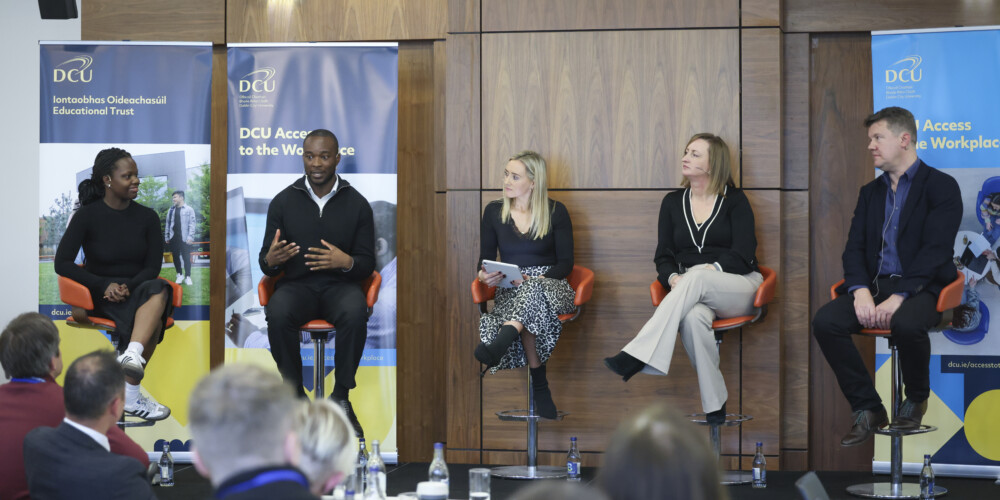
Access to the Workplace
Access to the Workplace (ATTW) is a collaborative initiative developed by Dublin City University’s Access Service in partnership with DCU Education Trust and philanthropically funded by LinkedIn and Rethink Ireland. This unique initiative is aligned to DCU’s commitment to transform lives and society. With the support of international professional and employment networking companies LinkedIn and Rethink Ireland, whose missions are building an inclusive and sustainable country, it has continued to grow from strength to strength.
As DCU currently has the largest Access cohort in Ireland (7.38% of total undergraduate enrolments in 2023/2024), we are committed to promoting equality of opportunity. By connecting disadvantaged and neurodivergent students with meaningful paid work placement, the Access to the Workplace programme seeks to support students in building the experience and confidence necessary to progress in their chosen career.
We established the programme in 2019 with the purpose of addressing structural barriers to employment opportunities faced by students from socio-economically disadvantaged backgrounds and students who are neurodivergent.
Research we conducted in 2019 identified that Access students did not have the same opportunities to acquire equivalent work experience or professional development opportunities as their peers, as they have fewer contacts in professional settings and they are unable to undertake unpaid internships due to the financial pressure of having to support themselves. This left Access students at a disadvantage compared to peers when competing for placements and graduate employment opportunities through our internship programme, INTRA.
We launched the Access to the Workplace initiative to provide both DCU Access students and neurodivergent students with a fully paid summer internship hosted by some of Ireland’s leading companies who participate in the programme. With limited resources, the pilot scheme reached 41 companies and successfully placed 50 students in meaningful work experience within professional environments.
Since then, our programme has evolved, adapted, and expanded in scope. We structured the initiative to combine practical work placements with a tailored Work Readiness Programme Access, which equips participants with the skills required to navigate recruitment processes and thrive in the workplace. This includes CV preparation, interview skills, workplace etiquette, and professional communication. Through the Employer Engagement Programme, we work closely with a wide range of employer partners to offer placements either in-person, remote, or in hybrid formats, depending on the needs of both the host organisations and participating students.
To ensure best practice and continuous monitoring of the programme lifecycle, our team holds frequent student meetings and conducts site visits. Learnings and adaptations based on beneficiary feedback are then discussed and implemented.
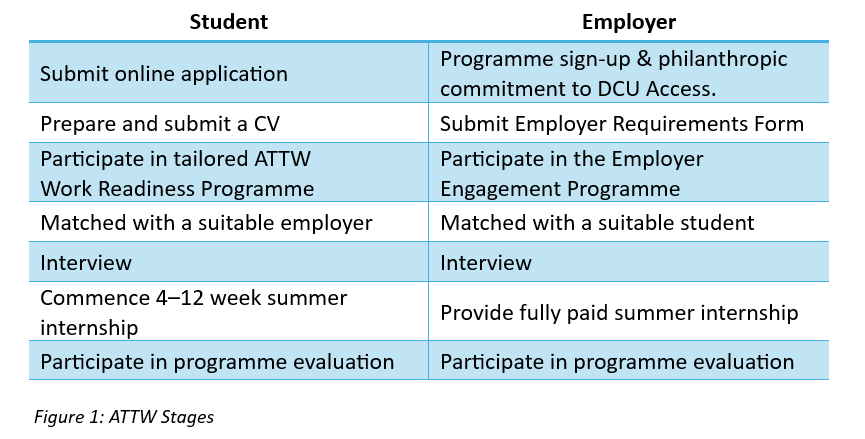
The impact of Access to the Workplace has been considerable, both for the students who participate in the programme and for the organisations that host them.
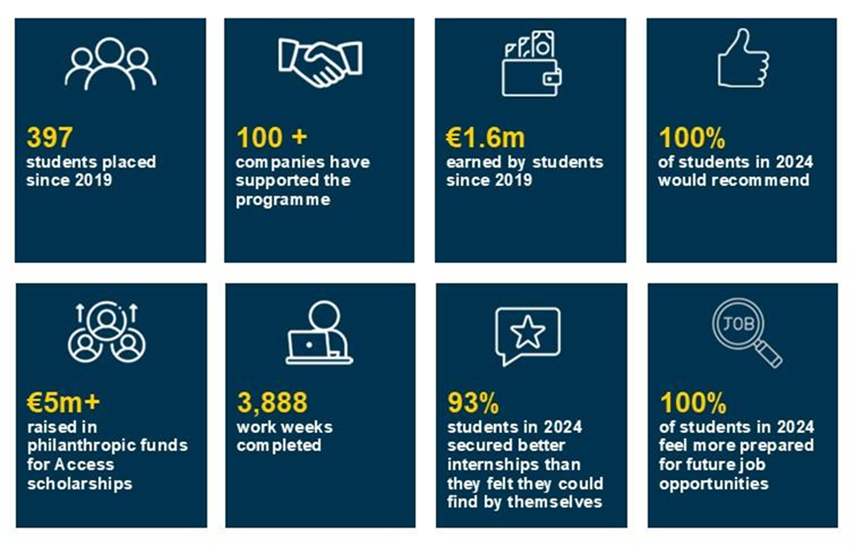
Figure 2: ATTW Impacts
Students
Almost 400 students have benefitted from the ATTW internships to date, employed by over 100 companies, with collective earnings of €1.6 million. The experience has been transformative for students, who receive support to build their confidence, clarify their career goals, and strengthen their motivation to succeed academically and professionally.
Through our evaluation mechanisms, we discovered that 96% of students indicated that participation in the initiative has increased their social and cultural capital to be equivalent with more socially advantaged peers, and 100% of participating students reported feeling more prepared for the world of work.
“I felt that the ATTW programme gave me an opportunity I might not have otherwise received. This opportunity was great for both my personal and professional growth, as the team I worked with put an emphasis on learning things that would benefit me in the future and not just during my summer placement.” 2024 Student Intern
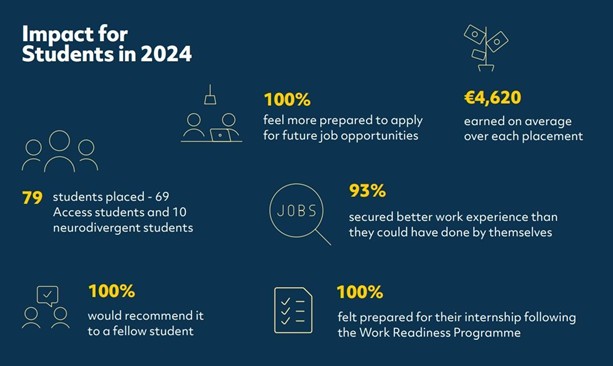
Figure 3: Impact for Students in 2024
Organisations
The ATTW initiative also contributes to the diversity, inclusion, and corporate social responsibility agendas of 21st-century workplaces. Through our programme’s support and training, we contribute to the companies’ ability to educate their workforces on EDI, enhancing their diversity and inclusion policies and practices. In addition, as our programme is strategically positioned as a Corporate Social Responsibility (CSR) and Equity, Diversity and Inclusion (EDI) initiative, corporate organisations are allowed to assign a financial budget to support the programme implementation. Through the ATTW programme, we also provide companies early access to a pipeline of young, ambitious talent from Ireland’s University of Enterprise. The 100+ companies who participate in this initiative are listed at https://www.dcu.ie/accesstotheworkplace/employers.
Employers consistently reported positive outcomes, with 83% of employers reporting that their workplace culture and overall reputation as a socially responsible employer has gotten better or significantly better, 91% stating the programme met or exceed their expectations, and 100% reporting that ATTW supported the development of their talent pipeline.
“Our Access to the Workplace intern brought with him a fresh insight on how to approach problems within a team environment. He brought new ideas, and his skills helped us advance some existing projects faster than we would otherwise have done.” Employer Partner
During the Covid-19 pandemic, with Deloitte’s support, we developed a toolkit to aid employers in adapting the internships to hybrid and virtual formats.
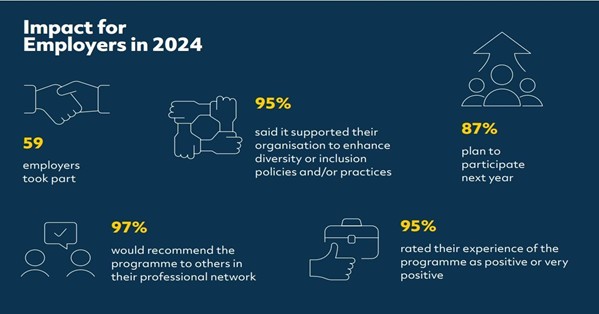
Figure 4: Impact for Employers in 2024
Social value
In 2022, our initiative was evaluated by Quality Matters Social Return on Investment (SROI), who estimated the social value generated by ATTW to be between €2.77 to €3.97 (for every €1 invested). The evidence shows that the initiative is successfully creating meaningful change, opening doors for students, strengthening employer engagement, and contributing to a more inclusive workplace.
Further research and evaluation from the Centre for Evaluation, Quality & Inspection (EQI) is currently in progress to assess broader impact on graduate employment and earnings.
Our initial research findings indicated that around 37% of third-level students obtain graduate employment through previous internships/work experience and personal contacts, including family or friend connections. Informed by these inputs, our original objective was to improve connection opportunities and social capital resources for students who entered DCU via the Higher Education Access Route (HEAR).
A 2017 CareerBuilder Survey of 1,014 hiring and human resource managers found that common neurodiversity traits such as reduced eye contact (68%), lack of smile (38%), playing with something on the table (36 percent) would make them less likely to hire someone. This data tells us that neurodivergent people are a disadvantaged group from the recruitment stage onwards, underrepresented in the workplace, and that they often do not get the same chance for career progression or to work in their chosen field as neurotypical colleagues.
Further research data reported high levels of unemployment in adults with autism, and that opportunities for people with disabilities are associated with lower salary bands. Additionally, the results of a large-scale survey made in 2020 showed a high level of bias from employers towards “neuro-minorities”, with many remaining hesitant to hire neurodivergent employees. These findings prompted the extension of the programme to include neurodivergent students registered in our Disability and Learning Support Service.
Supporting inclusion in the workplace
Prior to adding the neurodivergent cohort of students in the programme, we engaged with our DCU colleagues in the Disability Service and partner companies. Our colleagues in the Disability Service in DCU supported the initiative by delivering sessions on assistive technology and neurodivergence in the workplace to our partner companies, giving them confidence that they could provide a suitable placement for these students. The feedback received from neurodivergent students and from the companies that have hosted them have been overwhelmingly positive. As a result, ATTW students with disabilities, including students with autism, dyslexia, ADHD, or dyspraxia, have gained professional experience and built their social capital while positively contributing to the labour market.